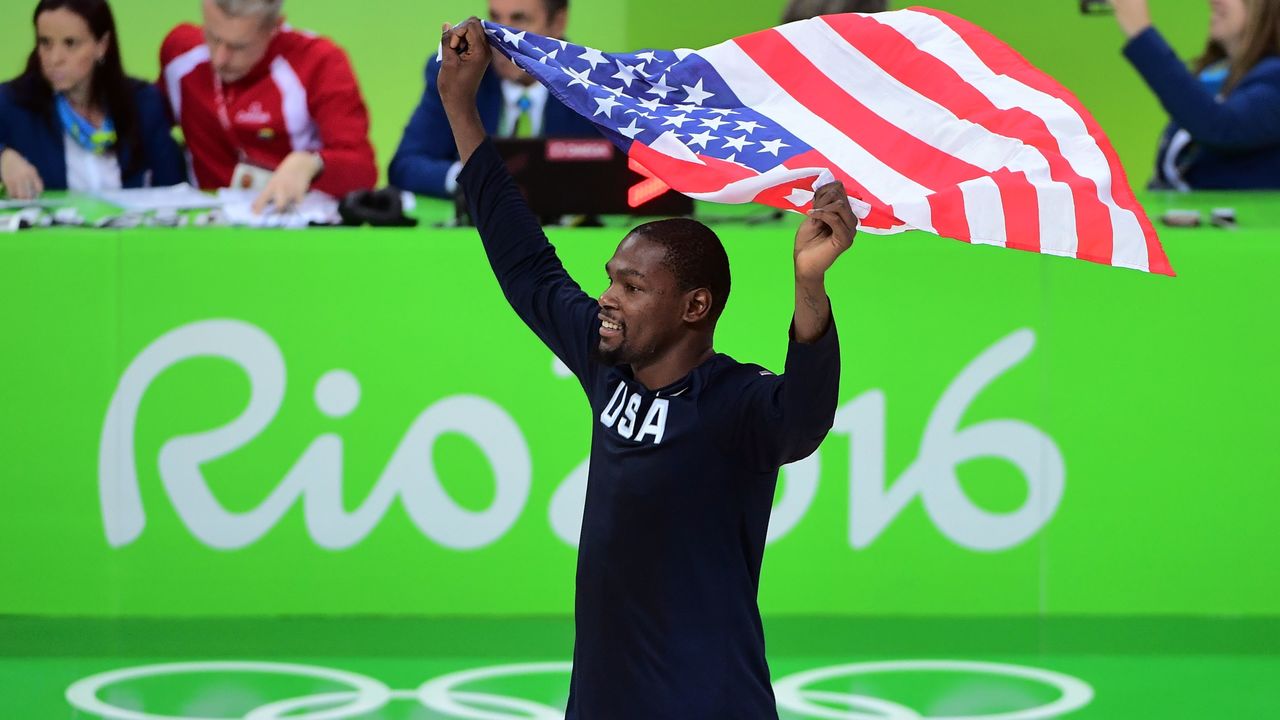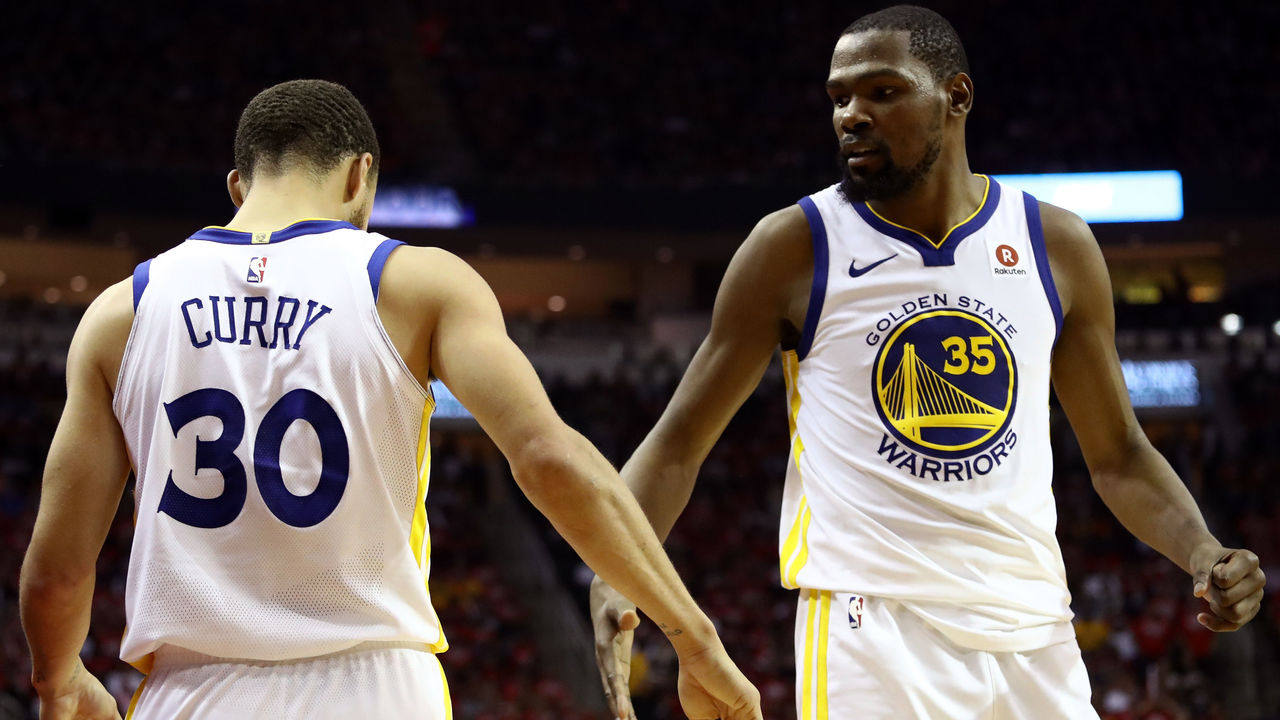No one's talking about Kevin Durant - and that's just the way he likes it
CLEVELAND - Through the first two games of the 2018 NBA Finals, Golden State Warriors superstar Kevin Durant is averaging 26 points, nine rebounds, 6.5 assists, and 2.5 blocks, and no one is really talking about it.
"Kevin is going to probably have 26 points whether he plays well or not," Warriors coach Steve Kerr said after Sunday's Game 2 victory over the Cleveland Cavaliers. "That's how talented he is."
Durant is one of the best players in the league - the second-best behind LeBron James in terms of pure talent and the ability to impact the game on both ends of the floor. He's the reigning Finals Most Valuable Player and is having himself another strong start to this year's series. And yet, on this Golden State team, Durant's presence is rarely felt, even when he is putting up superstar numbers.
It's partially because the Warriors already had their established identity of a ball-movement dominant offense built around Steph Curry and Klay Thompson, which won them a championship in 2015 and propelled them to a 73-win regular season the following year. The addition of Durant didn't change the identity of the Warriors, it simply amplified all of their strengths. In a way, there was no other option for Durant but to blend in.
And perhaps that's what he wanted after the failed championship conquests with Russell Westbrook and the national media attention surrounding the feasibility of their on-court partnership. In Golden State, he found a team he could ease into, one where the attention wouldn't fall on him. And he found success. A championship last year, and now, two wins away from a second one.
Durant has surely heard the criticism since moving to Golden State: how his addition to the Warriors ruined basketball, and how he gave up the opportunity to build a greater individual legacy for himself by going to Golden State, a team already built to win.
"I know a lot of people probably didn't watch me play before I got to the Warriors," Durant told the media before Game 1 of The Finals. "But I was in the league before I got here, and I learned a lot along that time. I actually won an MVP award. I went to the Olympics. Scored a couple points."

It's hard to fathom that Durant could think people did not follow his basketball career in Oklahoma City or appreciate what he does on the court. But perhaps it speaks to a larger point: Durant understands his legacy will be defined by what he does in Golden State, and if that's all people want to remember about his career, then what exactly will that legacy be?
This postseason has been starkly different from last year's playoff run, even if the numbers and the results have gotten the Warriors to the exact same place, up 2-0 in The Finals in a position to win a championship.
During last year's 16-1 postseason run, Durant had only 37 total isolation possessions. Per NBA.com, that number has gone up to 132 isolation possessions in these playoffs, the third-most in the league behind only James Harden (220) and LeBron (132). For comparison, Curry is second on the team with 38 isolation possessions.
At times during this postseason, it has felt as though Durant has been on his own island, playing his own brand of basketball instead of what has made this team successful. At Tuesday's practice, the main talking point on this topic was how the Warriors have had to adjust because the way defenses are playing them in the playoffs.
"Houston did such a good job of switching everything," Durant said. "And in basketball, when you switch everything, meaning pin downs, cross screens, just everything, it takes you out of your movement of your offense, and it puts the ball into the guys that create off the dribble the most. So I think that's the reason why things may look a little bit bigger than what they really are, as far as the iso stuff is concerned."
During the Western Conference Finals, Kerr pulled Durant aside and told him a story about how Michael Jordan eventually learned to trust his teammates and found John Paxson for a 3-pointer which clinched the 1993 NBA Finals.
"There's just a sense that we're all on the same team and nobody cares about whose team it is and all that stuff," Kerr said Tuesday. "There have been games where KD has had to take over. There have been games where Steph takes over. And there are a lot of games in between."
For Curry, the partnership has been about finding a happy medium.
"I think it's best when we're communicating with each other about what we see on the floor consistently," Curry said. "We've been doing a lot of that as of late, encouraging each other, but also kind of pinpointing things that we see. It's refreshing to hear that from his perspective, and I'm sure vice versa."

"Two years together, two seasons together," Durant said. "We've figured out a good balance."
A lot of the conversation around Durant's increased isolation usage during this postseason might be overblown. After all, as defenses adjust and take away the strengths of the Warriors' offense, it would make sense to put the ball in the hands of arguably the best one-on-one player in the league.
But it has been fascinating to watch Durant's role evolve in his second postseason with Golden State. Whereas last year's Finals pushed him into the conversation for best player in the league, Durant has receded more to the background this time, and he seems comfortable with being the No. 2 option on this team, with Curry leading the way.
Watching one of the best players in the league in this role, you wonder whether this is what Durant envisioned; not in the results - because he has won a title and will likely win another, and perhaps a few more - but in how the perception of how his career will be viewed because of his decision to join this championship team.
Even as he stands two wins away from a second consecutive title, it's a question that hovers over Durant.
Alex Wong is an NBA freelance writer whose work has appeared in GQ, The New Yorker, Vice Sports, and Complex, among other publications.
(Photos courtesy: Getty Images)